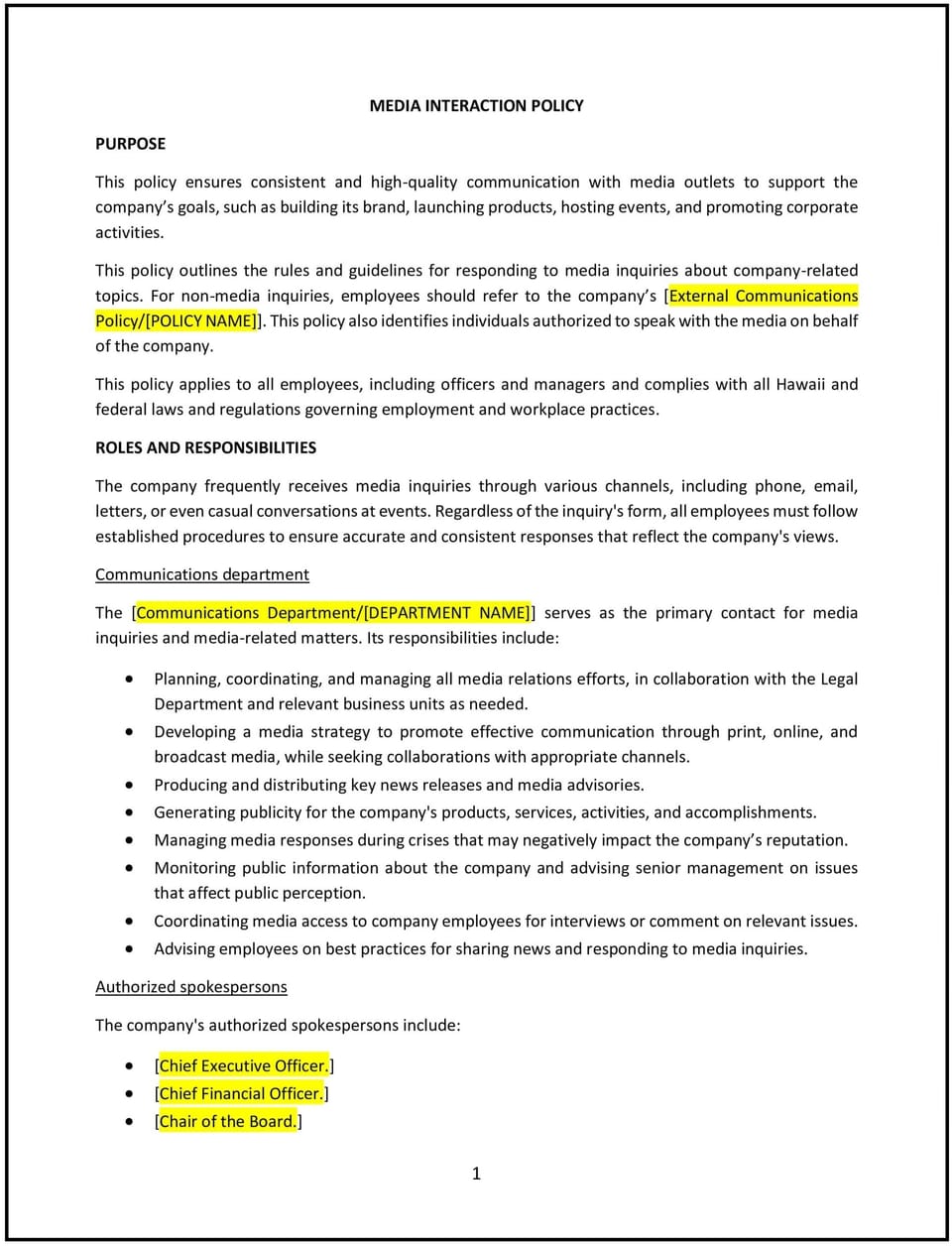Media relations policy (Hawaiʻi): Free template

Media relations policy (Hawaiʻi)
A media relations policy helps Hawaiʻi businesses establish guidelines for interacting with the media, including journalists, reporters, and other external communicators. This policy outlines procedures for responding to media inquiries, issuing press releases, and managing public statements, while addressing Hawaiʻi’s unique cultural and business environment. It is designed to protect the business’s reputation, ensure consistent messaging, and maintain positive relationships with the media.
By implementing this policy, businesses in Hawaiʻi can effectively manage their public image, respond to media inquiries professionally, and align communications with their brand values.
How to use this media relations policy (Hawaiʻi)
- Define media interactions: Specify the types of media interactions covered by the policy, such as interviews, press releases, or social media engagement.
- Designate spokespersons: Identify authorized individuals, such as executives or PR representatives, who are permitted to speak on behalf of the business.
- Establish approval processes: Provide guidelines for creating and approving media communications, including press releases, statements, or responses to inquiries.
- Address cultural sensitivity: Emphasize the importance of respecting Hawaiʻi’s diverse cultural heritage in all media communications.
- Train employees: Educate staff on the policy’s guidelines, including how to handle media inquiries and refer them to designated spokespersons.
- Monitor media coverage: Regularly review media coverage to ensure accuracy and address any misrepresentations or negative publicity promptly.
- Communicate the policy: Share the policy with employees during onboarding and through internal communications to ensure awareness and understanding.
- Review and update the policy: Regularly assess the policy’s effectiveness and make adjustments as needed to reflect changes in media trends, business needs, or cultural considerations.
Benefits of using this media relations policy (Hawaiʻi)
This policy offers several advantages for Hawaiʻi businesses:
- Protects the business’s reputation: Clear guidelines help prevent miscommunications or inappropriate statements that could harm the business’s image.
- Ensures consistent messaging: Standardized procedures ensure all media communications reflect the business’s brand voice and values.
- Builds trust with the media: Professional and transparent interactions foster positive relationships with journalists and reporters.
- Enhances public image: A thoughtful approach to media relations strengthens the business’s reputation among customers, partners, and the community.
- Reduces risks: A structured policy minimizes the likelihood of legal or reputational issues arising from poorly managed media interactions.
- Encourages accountability: Employees understand their responsibilities for handling media inquiries and referring them to authorized spokespersons.
- Supports inclusivity: Respecting Hawaiʻi’s cultural diversity in media communications demonstrates the business’s commitment to inclusivity.
Tips for using this media relations policy (Hawaiʻi)
- Communicate the policy effectively: Share the policy with employees during onboarding and through regular reminders, such as emails or training sessions.
- Provide training: Educate staff on the policy’s guidelines, including how to handle media inquiries and refer them to designated spokespersons.
- Use templates: Provide approved templates for press releases or media statements to ensure consistency and professionalism.
- Monitor media coverage: Regularly review media coverage to ensure accuracy and address any misrepresentations or negative publicity promptly.
- Be transparent: Clearly explain the policy’s purpose, benefits, and expectations to employees to build trust and cooperation.
- Review the policy periodically: Update the policy as needed to reflect changes in media trends, business needs, or cultural considerations.
Q: Why should Hawaiʻi businesses adopt a media relations policy?
A: Businesses should adopt this policy to protect their reputation, ensure consistent messaging, and maintain positive relationships with the media.
Q: Who is authorized to speak to the media?
A: Only designated spokespersons, such as executives or PR representatives, should speak on behalf of the business.
Q: How should businesses handle media inquiries?
A: Employees should refer media inquiries to designated spokespersons, who will respond in accordance with the policy’s guidelines.
Q: What should be included in a press release?
A: Press releases should include accurate, concise, and relevant information that aligns with the business’s brand and messaging.
Q: Why is cultural sensitivity important in media communications?
A: Respecting Hawaiʻi’s diverse cultural heritage in media communications demonstrates inclusivity and strengthens the business’s connection with the community.
Q: What training should businesses provide to employees?
A: Businesses should educate staff on the policy’s guidelines, including how to handle media inquiries and refer them to authorized spokespersons.
Q: How often should the policy be reviewed?
A: The policy should be reviewed annually or as needed to reflect changes in media trends, business needs, or cultural considerations.
This article contains general legal information and does not contain legal advice. Cobrief is not a law firm or a substitute for an attorney or law firm. The law is complex and changes often. For legal advice, please ask a lawyer.


